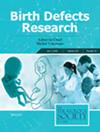MotherToBaby and CDC: Partnering to Provide a Rapid and Personalized Response to COVID-19 Vaccine Inquiries During Pregnancy and Lactation
Abstract
Background
When coronavirus disease 2019 (COVID-19) vaccines first became available, pregnancy and lactation data were lacking. This void was often filled by misinformation. Even as data about pregnancy outcomes following COVID-19 vaccination began to emerge, the public was often unsure how to interpret the information, and many pregnant women remained unclear on whether to get vaccinated. MotherToBaby and Centers for Disease Control and Prevention (CDC) quickly partnered to direct the public to MotherToBaby, a nationwide teratogen information service, for free and confidential discussions about COVID-19 vaccines in pregnancy and lactation. This paper describes the partnership between MotherToBaby and CDC and the resulting COVID-19 vaccine inquiries received.
Methods
Aggregate, deidentified data were extracted from a centralized database utilized by MotherToBaby to capture information about exposure inquiries. The data include exposure topics, caller characteristics, and specific questions about COVID-19 vaccination.
Results
Between March 1, 2021 and February 28, 2023, MotherToBaby answered 11,064 questions about COVID-19 vaccines. Most (68.5%) were related to vaccine safety, with common safety-related themes including perceived haste in vaccine development, hesitancy about mRNA technology, and concerns about infertility, miscarriage, and long-term effects on the child. Lessons learned include the essential role of partnerships to educate the public during emergencies, the importance of building staff capacity during nonemergency times, and the need for one-on-one conversations to counter vaccine misinformation.
Conclusions
During the COVID-19 pandemic, MotherToBaby met a critical need by providing individualized, evidence-based information to the public. During future public health emergencies, teratogen information services are uniquely suited to provide unbiased information about the risks and benefits of vaccines and other exposures.

 求助内容:
求助内容: 应助结果提醒方式:
应助结果提醒方式:


